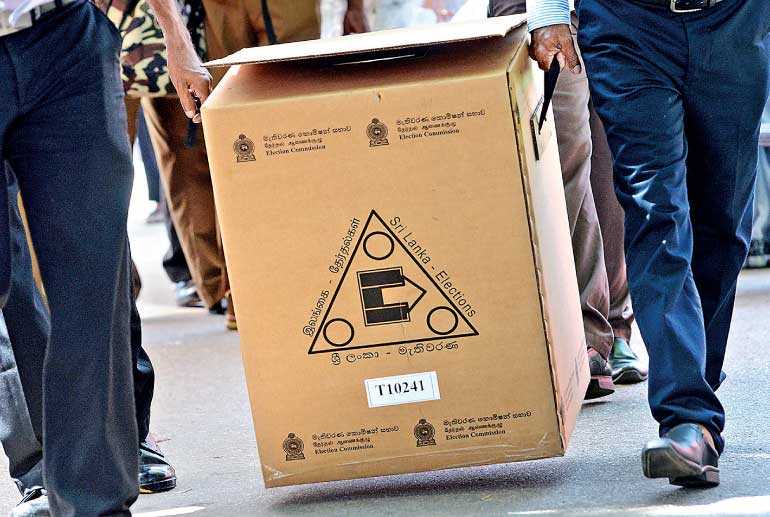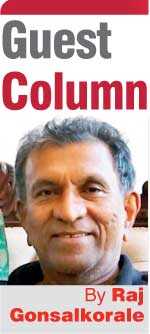Friday Feb 20, 2026
Friday Feb 20, 2026
Thursday, 9 July 2020 00:03 - - {{hitsCtrl.values.hits}}

Sri Lanka prides itself that it has had a democratic system of governance since Independence in 1948. This is true to the extent that we have elected and changed governments through the ballot rather than the bullet. Looking towards the future, and in particular in the backdrop of the impending, General Election on 5 August, it might be useful to have a discussion on how the country could make democracy more meaningful to the citizens – Pic by Shehan Gunasekara
 Democracy may be a word familiar to most, but it is a concept still misunderstood and misused at a time when dictators, single-party regimes, and military coup leaders alike have asserted popular support by claiming the mantle of democracy. Late Robert Mugabe comes to mind. Some may say Donald Trump is not far off if one considers his governance style!
Democracy may be a word familiar to most, but it is a concept still misunderstood and misused at a time when dictators, single-party regimes, and military coup leaders alike have asserted popular support by claiming the mantle of democracy. Late Robert Mugabe comes to mind. Some may say Donald Trump is not far off if one considers his governance style!
Amongst much touted developed countries, Singapore is a good example of a country which claimed to be a democracy while it was in effect a single party authoritarian regime which stifled any opposition to it. It broke the spirit of its Opposition Leader J.B. Jeyaratnam by regularly jailing him for spurious “crimes” committed by him.
Singapore has done very well for itself economically, but those who hail it as a successful country must acknowledge that there was a cost in achieving it, this being the infringement of all pillars of democracy like freedom of expression, of assembly, and a free press, on its road to material success. In hailing Singapore, many seem oblivious to the price paid in achieving this success.
Democratic idea for governance
The power of the democratic idea for governance has prevailed through a long and turbulent history, and democratic governance with all its shortcomings, despite continuing challenges, continues throughout the world. Democracy, which derives from the Greek word demos, or people, is defined, basically, as government in which the supreme power is vested in the people, and as President Abraham Lincoln stated, it is government of the people, by the people, and for the people.
There is much debate whether Lincoln’s phrase rings true in practice in many democracies, including in his own country, the USA. While freedom and democracy are often used in synonymy, the two are not necessarily synonymous in reality. Democracy should be the institutionalisation of freedom. But is it?
Democracy is supposed to rest upon the principles of majority rule and individual rights. In the context of what the world has witnessed, historically and in a contemporary sense, this is also in question.
Our own situation vis-à-vis the longstanding Tamil issue comes to mind. In order to dilute the absolute power of majority rule, and guard against all-powerful majority ruled central governments, decentralisation of governance to regional and local levels of government is promoted in democracy. Sri Lanka has struggled with this concept.
Citizens in a democracy have not only rights, but also the responsibility to participate in the political system that, in turn, protects their rights and freedoms. Democratic societies are committed to the values of tolerance, cooperation, and compromise. In the words of Mahatma Gandhi, Intolerance is itself a form of violence and an obstacle to the growth of a true democratic spirit. Sri Lanka, like many other countries, including India, with some form of democratic governance has had limited success when it comes to tolerance, cooperation, and compromise.
Sri Lanka
Sri Lanka prides itself that it has had a democratic system of governance since independence in 1948. This is true to the extent that we have elected and changed governments through the ballot rather than the bullet. People have exercised their sovereign right as a democracy. We have degrees of media freedom, and at times, fluctuating political interference in law enforcement, dispensation of justice and in the conduct of elections.
The article is not an analysis or a critique of what proponents of this conclusion have maintained throughout. No democracy is perfect and no country has a democratic governance system that is perfect. Sri Lankans must be thankful we have had a democratic system of governance with all its imperfections rather than not. The alternatives would have been too damning.
Looking towards the future, and in particular in the backdrop of the impending general election on 5 August, it might be useful to have a discussion on how the country could make democracy more meaningful to the citizens.
In a practical sense, features that are the core for meaningful democracy for people may be mentioned as the freedom of expression and a free media that is able to express such expression, an independent judiciary and a law enforcement system that is free of political dictates and interference, and an independent election authority that ensures free and fair elections.
In this regard it has to be stated that with all its imperfections, the 19th Amendment to the Constitution and the independent Commissions that came to be due to it, advanced the cause of democracy. Any future attempt to reverse these gains, would be a reversal of that advancement. If we wish to call ourselves a mature democracy, we should strengthen these independent commissions rather than diluting their independence.
These Commissions and hopefully other similar entities are the foundations that strengthen a democracy. The outcome on 5 August should look towards doing so as it is these institutions that are here to stay and not those who will be elected to sit in the august building on Diyawanna Oya.
Looking towards the future
Looking towards the future, it is opportune perhaps to consider the three types of democracy. Consensus democracy – rule based on consensus rather than traditional majority rule. Constitutional democracy – governed by a constitution. Deliberative democracy – in which authentic deliberation, not only voting, is central to legitimate decision making.
While it may be true that we have had some degree of consensus democracy, it cannot be said that it has extended to major national issues like the Ethnic issue, the language issue, economic issues, and foreign policy issues. Political ideologies, political opportunism and dictates of external power sources have all contributed to a lack of consensus on broad policy settings on these issues.
To the credit of Sri Lanka, it could be said that we have had constitutional democracy, although there are issues that need to be discussed with regard to constitution making and whether constitution making processes have had an adequate amount of deliberations with the people for whom these constitutions are designed and whether there has been an adequate amount of tolerance, cooperation, and compromise with all communities.
It must be said that in mature democracies, everyone should strive to learn to expand their degree of tolerance of each other. There is a question mark as to the degree of tolerance that the Islam faith has of others as events have shown in several countries. Sri Lanka too experienced this when a mindless event took place during Easter in 2019. From a global perspective, if some extremist elements of the Islamic faith feel that other faiths, or for that matter more liberal minded followers within their own faith pose a danger to an ancient and evolved religion like Islam, surely those who fear so cannot have sufficient trust in their own faith!
One could say the same of the bigots within the Sinhala community, in particular elements of the Sinhala Buddhist community who took upon the despicable task of attacking the Tamil community in 1983. It was even more despicable as the government in power then had prior knowledge of the impending pogrom and as many suspect, a hand in organising it.
The Constitution
President Gotabaya Rajapaksa and Prime Minister Mahinda Rajapaksa have publicly stated that they wish to change the existing constitution or introduce a new one. No doubt there is a case for change if the intention is to strengthen it from a democratic perspective, rather than to strengthen the hand of some individuals who are its temporary custodians. Flaws in the 19th Amendment are cited as a case in point as to why the Constitution should be changed. One can only hope that in changing it, the constitution framers do not throw the baby out with the bath water by throwing out what is good in the 19th Amendment like the Independent Commissions.
From a very fundamental context, there is a major flaw or a drawback that impacts on it being the Lincolnian “for the people, by the people” document. This is the assumption by those who have framed it in the past, that what they have framed is for the people even if there has been very little or no consultation with the people.
Secondly, the little or no effective choice that people have in electing representatives to represent them in Parliament. A list of candidates is presented to the voters by political parties or independent groups, where people have had no say in how they were included in the lists. Whereas a pre selection process for inclusion in a list should be carried out by at least people who are registered with the respective political parties, this task is now done by the hierarchy of the political parties themselves.
In this scenario, there is hardly any consultation with the people as to who should represent them in Parliament, and thereafter, there is no consultation with the people on formulation of policies that that impact on them. In the absence of deliberative or participative democracy, there is naturally no consensus outcomes, and therefore what emerges as constitutional democracy is a flawed form of democracy.
The reality is that the Central, majority ruled Parliaments in Sri Lanka have decided what is good for the people, whilst not appreciating the societal, social and religious diversity of the country.
They have played with the very fundamentals of democracy by politicising issues for electoral gains and for remaining in power. This begs the question, how one could minimise the probability of misuse of democratic principles for the benefit of a few for the detriment of many.
Future constitution making must consider this and introduce a structure and a process that involves a genuine consultative process with the people including how candidates are included in district lists during elections.
Another major flaw in the current and past constitutions is the absence of a mechanism to ensure a fair and equitable representation of women and persons of different ethnicity from all districts in Parliament. It should be a document that empowers people to weed out undesirables and it should be a document that provides for representation that reflects gender reality and the diversity of our society. A constitution should be a document that has ownership and the respect of the people. It is nothing if it does not.